Google is typically the first port of call when people look for general or product information. Search engine optmisation (SEO) isn't just important to get businesses on a prospect's radar, it's also a retention tool. When your existing clients search for information and your business keeps coming up, it's an endorsement. That's why we have technical and content SEO specialists in-house.
SEO agency
EO is one of the pillars on which successful communication strategies are built. That’s because you can produce the best content in the world but it’s no good unless the right people see it. If your content comes up when people search for relevant terms your brand awareness will increase and more traffic will come to your website, generating more online leads. Pretty much all businesses have SEO on their agenda but only few truly optimise their websites.
SEO doesn’t sort itself out. It requires a strategy and longer-term thinking. To be successful, you need a partner that really understands how to work with search engine algorithms and what the ongoing changes to the algorithms mean to your business. Broadly speaking, there are two sides to SEO, a technical and a content side.
We have SEO specialists in-house who make sure businesses are found online by their prospects and clients.
When to consider SEO
Doing SEO properly pays dividends. On average and depending on the industry sector, businesses generate 40-56% of their revenues from online search. So no other marketing channel drives more revenues, and that’s across all industry sectors. Therefore, optimising a business’s website can significantly contribute to revenue growth.
SEO is all about organic traffic, which means businesses don’t pay when prospects land on their website following and online search. There are also paid-for models. Businesses often also use online advertising, for example pay per click, where they pay the search engine operator for every click on their ad.
Exactly how much more traffic and revenues you can generate from your optimised website depends, to a degree, on your business and processes. Research, however, shows that only businesses that are on page one or two for their relevant search terms really get more traffic to their site. Page one displays the top 10 search results and they account for 92% of click-throughs on average. Businesses should ideally rank in the top 10 and certainly in the top 20 for their relevant search terms. If that’s not the case yet, your business may be missing out on a substantial revenue opportunity.

Professional SEO consulting
What is good for SEO today can be bad for your search engine rankings tomorrow. The reason for that is that search engines continuously adjust their massively complex algorithms and, generally speaking, they don’t like it when businesses manipulate their results. Be careful when some SEO experts promise you results that sound too good to be true. Certain SEO methods bring quick gains but long-term damage!
We work with your developers and marketing team to optimise your website in a way that helps you generate more online leads now and in the future. Our technical and content SEO specialists help businesses get their foundations right and then work with them to develop and implement a plan that gets the business rank for terms that are likely to generate high-quality leads.
SEO health check
Before we advise on the SEO strategy going forward, we carry out an analysis of the businesses’ online presence. We look at keywords, the usability of the website and coding. That allows us to talk about how each individual business can get the most out of its SEO efforts, specific to their situation. Some businesses can improve their ranking simply by adding certain tags in their code or, on the more complex side, by helping users get what they want from the website quicker (user journeys).
As consultants, we’re just as used to having technical discussions with developers as we are to explaining issues and enhancements to business owners with no or very little SEO knowledge. We compile a list of action points, answer questions and ensure results are measurable.
Keyword analysis & tracking
Knowing what keywords to optimise your website for is essential. What matters here is what your audience actually searches for, not what you call your products. For example, a business optimised its website for ‘mobile phone protectors’ when its clients were actually searching for ‘mobile phone cases’, so the business missed out on traffic and revenues. Algorithms have ‘learned’ to take context into account but an exact keyword match still helps businesses rank above their competitors.
We compile keyword lists and establish how popular each keyword is in terms of search volumes and with the competition. There may be a few quick wins with less competitive keywords, while highly competitive ones, if necessary at all, may require a more structured approach. We’ll track the most important keywords for you in regular intervals and report on how you and your competitors rank for them.
KPI monitoring & reporting
Search engine rankings are very important but what really matters to you are revenues. While more traffic typically results in more leads, we always analyse how relevant the traffic you attract really is and what you gain from the traffic.
Have your rankings improved? How much extra traffic has that generated? Which pages drive traffic? Which pages need to perform better? What journeys do users take on your website? How many form fill-ins have you had? Have they converted into sales? We regularly report on all this and advise you on changes you may wish to consider to attract the right traffic and convert a higher percentage.
SEO copy & landing pages
Good copy isn’t just important from an SEO perspective but even more so to sell the benefits of your product or service. No matter whether you write copy in-house or have it written by an agency, the single most important thing is that it adds value, that your audience finds it useful. We have extensive experience of writing SEO-optimised copy and it doesn’t stop there. We also share our knowledge with our clients’ marketing teams to help them write even better copy for their customers and for search engines. Simply ask us about the workshops we offer.
We use our keyword analysis to create content for landing pages and blog posts. Each piece of content is optimised for a particular set of keywords to improve your search engine rankings. All content is written and structured in a way that drives lead generation and conversion. There’s always a call to action and your audience will be encouraged to take action. Our copy is comprehensive, value-adding and works well visually because research shows that this kind of copy is best for the audience and search engines. The chart demonstrates the correlation between longer-form, useful copy and search engine rankings.

On-page optimisation
On-page optimisation is all about looking at what can be done better from an SEO perspective on your own website, including technical aspects such as server performance and coding, content creation and the use and positioning of keywords as well as an analysis of how much time your prospects or clients spend on a page and what actions they take. The aim is to tell search engines that when someone types a particular term or phrase into the search field, the content you have on your website will be highly relevant.
While search engines increasingly act like humans, they’re still just algorithms, so they ‘digest’ information differently. That’s what many websites don’t take into account. On-page optimisation tells search engines what the most important parts of the website as a whole and individual pages are. It ensures that the coding of the website doesn’t confuse search engines and that, overall, search engines and your website talk the same language.
Off-page SEO & link building
Off-page optimisation is just as important as on-page optimisation. At the heart of off-page optimisation is link building. The focus here has fundamentally changed in recent years. A while back, SEO specialists just bought or used other means to create backlinks for the sake of it, which meant less relevant content was sometimes pushed up the rankings. Now search engines heavily penalise what they regard as ‘artificial’ link building. It’s essential that backlinks come from an established website or blog post, ideally one that ranks highly itself. Those backlinks are, of course, much harder to get.
With its background in PR and communications, Tonka is ideally positioned to create value through link building. Our communication campaigns are designed to generate interest from and add value to media organisations, including broadsheets, tabloids, television and radio stations, the trade press as well as local media outlets. These high-quality backlinks boost our clients’ online performance not just now but for months, even years to come. And we’ll also advise on how you get rid of damaging backlinks from the past.
SEO competitor analysis
Few businesses have products and solutions so unique that there are no competitors out there. You can learn a lot from a detailed SEO competitor analysis. You can see, for example, which keywords and pages work best for them, where their focus is and what they do to convert traffic. Taking a good look at how competitors generate business online helps you better position your website and be more competitive.
We have the tools and knowledge to carry out a professional SEO competitor analysis of your main competitors. Where are they ahead of what you’re doing on the SEO front? What do they use on the technical side? What type of content and campaigns works best for them? We help you learn from their experience so that you get better results faster.
User signals
Search engines look for user signals to establish whether or not people find your content useful when typing in a particular search query. So when you get a lot of click-throughs because you come up in the top search results but people coming to your website leave almost immediately and click on other search results and maybe even spend more time on a competitor’s website, search engines will see that as a negative user signal and start ranking your content below your competitor’s.
We keep a close eye on various user signals. When you’re listed in search results, how often do people actually click on your content? What’s your bounce rate like? How much time do they spend on your website and do they take action, such as visit several pages, fill in a form or watchg one of your videos. All this helps us improve your conversion rates.
Mobile SEO
Mobile first isn’t the latest catchphrase, it’s more and more becoming a necessity. The reason for that is that increasingly searches happen on mobile and decreasingly on desktop devices, so search engines have aligned themselves with what people are already doing. Google now uses mobile versions first and foremost to score content, and that’s even for desktop users.
While a large number of websites are now mobilefriendly in one way or another, there are still many where elements of the website are not mobilefriendly or the mobile version isn’t comprehensive enough. Also, mobile page load speeds frequently prevent content from ranking higher. We show businesses where their weaknesses are in mobile optimisation, if there are any, and how to fix them to generate more business online.
Workshops & seminars
You want your business to get more out of SEO? We’ll share our knowledge with your teams so that they keep SEO best practice in mind whatever project they’re working on. Understanding and using free tools such as Google Analytics can be a great benefit.
We tailor our training to your needs. We understand that individual team members may have varying degrees of SEO knowledge and take that into account. Where possible, training is hands-on and when we finish the session, your teams will be all set and ready to implement their new skills straightaway.


 PR
PR Content Marketing
Content Marketing SEO
SEO Social Media
Social Media Graphic Design
Graphic Design Ad Copywriting
Ad Copywriting










